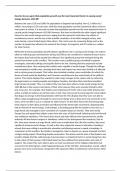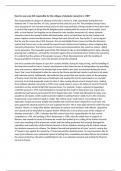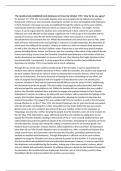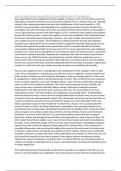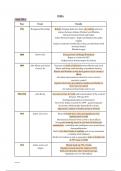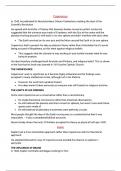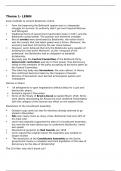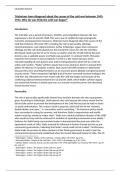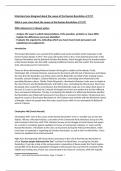PEARSON (PEARSON) • History
Latest uploads for History at PEARSON (PEARSON). Looking for History notes at PEARSON (PEARSON)? We have lots of notes, study guides and revision notes available for History at PEARSON (PEARSON).
-
80
- 0
-
4
Modules History at PEARSON (PEARSON)
Notes available for the following courses of History at PEARSON (PEARSON)
Latest notes & summaries PEARSON (PEARSON) • History
Between the years 1520 and 1688, the population of England had doubled, from 2.5 million to 5 million, increasing by 0.5% each year; with this rising population and the inadvertent effect it had on many parts of society, it is accurate to state that population growth was the most important factor in causing social change between 1625-88. However, this does not diminish the other largely significant factors for why social change occurred, ranging from the spread of racial ideas, the effects of re...
To state that religious dissenters were a significant threat to the authority of Charles II and James II in the years 1660-88 is an accurate statement due to the tension between the monarchy and parliament that they attributed, thereby raising the threat they posed. During this time period, religious dissenters were defined as anyone who did not conform to the Church of England; this included Quakers, Presbyterians and Congregationalists. Whilst their survival can be credited to the dedication a...
The responsibility of collapse of absolute monarchy in France in 1789, specifically during the time between the 5th May and the 14th July, cannot be tied solely to Louis XVI. The problems facing France were too great for any monarch to bear and even the most proficient of kings would not have been able to control the impact of things like the Enlightenment coupling with the unrest of their people. Louis’ skills, or lack thereof, for kingship can be blamed for why absolute monarchy fell, where ...
On October 31st 1793, the 21 Girondin deputies who were purged from the National Convention during June of that year were executed, allowing the Jacobins to seize and establish total dominance in Paris. However, this purge was only accomplished through the violent use of the sans-culottes, meaning the dominance they held was reliant on violence and, therefore, very fragile. For this reason, it can be argued that the Jacobins were only dominant in Paris, where the sans-culottes' influence was mo...
The responsibility for the establishment of the republic in France in 1792, from the 20th June to the 10th August, cannot be deemed to be caused by the outbreak of war in spring of that year. Although notable, other underlying problems led up to the establishment of the French republic in 1792. which the war exacerbated. Acknowledging that a republican government involves the idea that sovereignty rests with the people, where laws are made by elected representatives of the people, it can be argu...
This document has a timeline of events, separated in topics like the exam in A* style standard. It is coherent and easy to understand summary of the key events and time periods within Paper 2 history.
This is a full, in-depth and comprehensive summary for The Coming of the Age of Science and Reason from The Witch Craze paper 3, A-Level Edexcel History. This includes what Copernicus, Kepler, Galileo, Newton, Bacon, The Royal Society, Hobbes and Locke discovered/believed and the extent to which these discoveries/limitations were significant and limited.
This is a vital set of concise notes for Theme 1 Communist government in the USSR between 1917-85. It takes you through leader by leader and what the government of each leader did.
I got 40/40 100% on this Cold War Coursework. In depth analysis, accurate references, use of many different authors and arguments and clear line of argument.
Edexcel History A-Level Coursework essay on the question "What is your view about the causes of the Russian Revolution of 1917?" with references and footnotes I achieved a 46/50 for this particular coursework and overall an A* in 2022 summer A-level History exams.

